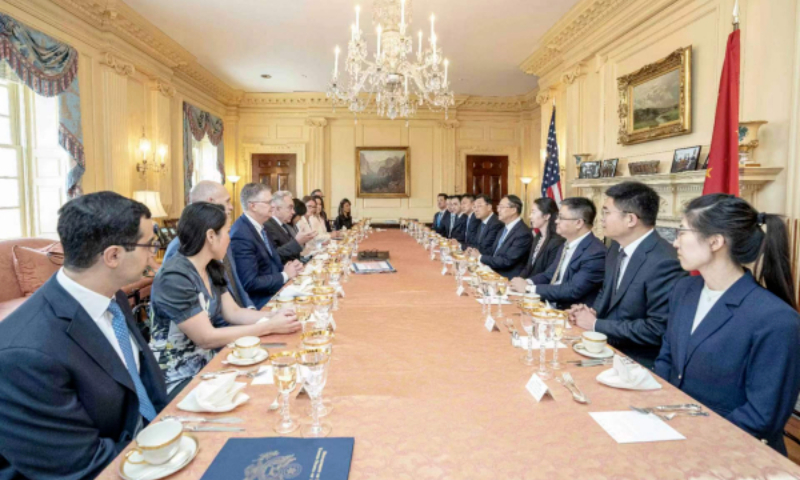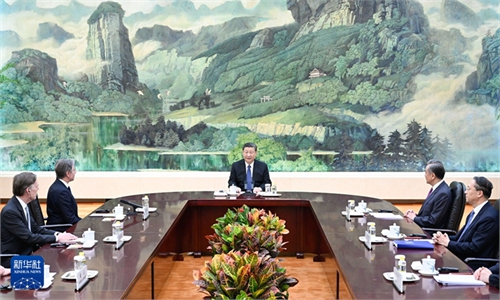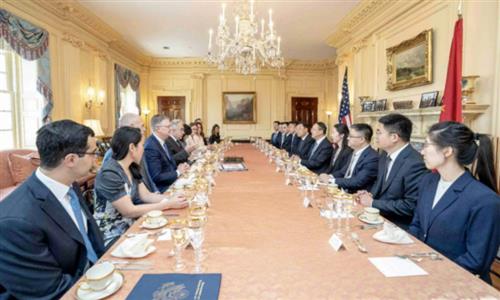China warns US about redlines on core interests as vice FM visits Washington at critical juncture

Photo: fmprc.gov.cn
Chinese Vice Foreign Minister Ma Zhaoxu's visit to the US from Thursday to Sunday aimed at sending a clear message to the US about China's redlines on its core interests while also maintaining communication between senior officials in the two countries, said Chinese experts. They also noted that if the US refuses to stop its provocations and hostile measures toward China, the tensions between the two major powers will be difficult to stabilize while Washington is still mired in problems in the Ukraine and Gaza.
China-US relations are at a critical stage of preventing deterioration and promoting stability and the US' approach of seeking dialogue while harming China's interests is unworkable. There is no future in zero-sum games under the guise of competition, and China will not accept suppression or deprivation of its legitimate development rights, Ma said while holding consultations with US Deputy Secretary of State Kurt Campbell in Washington on Thursday local time.
During Ma's consultations with Campbell, both sides had a candid and in-depth exchange of views on China-US relations and international and regional issues of mutual concern. The talks were described as constructive, according to the Chinese Foreign Ministry.
According to the Chinese Foreign Ministry, during his visit to the US, Ma also met with US National Security Adviser Jake Sullivan and US Deputy National Security Adviser Jon Finer.
Ma and Finer had a "candid, in-depth and constructive" talk on China-US relations and the international and regional issues with which both sides are concerned. Ma also met Sullivan separately to discuss "important issues in bilateral relations," said the release of the Chinese Foreign Ministry.
According to the Chinese Foreign Ministry on Sunday, Ma also met US strategists and scholars at the headquarters of the Aspen Institute in Washington DC, where they had in-depth exchanges on China-US relations and international and regional issues.
Chinese analysts said that Ma's visit to the US, on one hand, is to maintain communication between the two countries and try to make the most important bilateral ties of the world more predictable, while on the other hand, it also sends a clear message from China to the US on critical topics like the Taiwan question and the Ukraine crisis, to make sure the US understands the consequence of crossing China's redlines.
"In the first half of 2024, we see that the US' suppression and hostile measures against China in all fronts still exist and are even increasing despite some communication channels being rebuilt. From China's perspective, we hope to manage the differences by communication and stabilize the tension. However, unfortunately, the US is not thinking in this way, as Washington believes that as long as the communication exists, the US can be more assertive and aggressive to take actions against China's core interests and development," Li Haidong, a professor at the China Foreign Affairs University, told the Global Times.
According to China Central Television, Ma told press on Friday that the Taiwan question is the first redline that must not be crossed and the most "important, sensitive and explosive issue" in China-US relations. The so-called Taiwan independence and the cross-Taiwan Straits peace and stability are as irreconcilable as fire and water. If the US really wants cross-Straits peace and stability, it should abide by the one-China principle and the three China-US joint communiques, and honor its promise of not supporting "Taiwan independence."
The two sides also discussed international and regional issues concerning Ukraine, the Middle East, and the Korean Peninsula during the meeting between Ma and Campbell.
Ma emphasized that China firmly opposes the US spreading false information and making accusations against China on the Ukraine issue. China will firmly safeguard its interests, and demands that the US stop smearing and pressuring China, stop imposing unilateral sanctions on Chinese companies, and play a constructive role in resolving the Ukraine crisis.
"China has its own consistent and clear position on the Ukraine crisis. By making groundless accusations against China on the pretext of the Ukraine crisis, the US will not only fail to solve any problem, but also make trouble that is not supposed to be a part of bilateral relations at all. This unwise move will undoubtedly further complicate China-US relations rather than stabilizing the status quo," Diao Daming, an associate professor from Renmin University of China, told the Global Times on Sunday.



